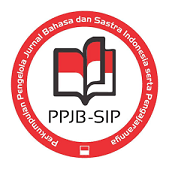PENERAPAN MODEL PEMBELAJARAN BERBASIS PROYEK (PROJECT BASED LEARNING) DALAM PEMBELAJARAN MENULIS TEKS PROSEDUR KOMPLEKS OLEH GURU DI KELAS X BAHASA BUDAYA DI SMA NEGERI 4 SINGARAJA
DOI:
https://doi.org/10.23887/jjpbs.v3i1.5290Abstrak
Penelitian ini bertujuan (1) mendeskripsikan wujud perencanaan (Silabus dan RPP) penerapan model pembelajaran berbasis proyek (project based learning) dalam pembelajaran menulis teks prosedur kompleks kelas X Bahasa Budaya SMA Negeri 4 Singaraja, (2) mendeskripsikan hambatan penerapan model pembelajaran berbasis proyek (project based learning) dalam pembelajaran menulis teks prosedur kompleks kelas X Bahasa Budaya SMA Negeri 4 Singaraja, dan (3) mendeskripsikan keunggulan penerapan model pembelajaran berbasis proyek (project based learning) dalam pembelajaran menulis teks prosedur kompleks kelas X Bahasa Budaya SMA Negeri 4 Singaraja. Penelitian ini menggunakan ancangan deskriptif-kualitatif. Subjek penelitian adalah guru bahasa Indonesia dan siswa kelas X Bahasa Budaya serta objek penelitian ini ialah pembelajaran menulis teks prosedur kompleks dengan model pembelajaran berbasis proyek (project based learning) di kelas X Bahasa Budaya yang meliputi: perencanaan, hambatan, dan keunggulan dalam pembelajaran teks prosedur kompleks. Data penelitian ini dikumpulkan melalui metode observasi dan wawancara. Instrumen penelitian ini adalah lembar observasi dan dokumentasi. Hasil penelitian ini menunjukkan (1) wujud perencanaan (silabus) yang mencakup beberapa komponen, yaitu komponen silabus Kurikulum 2013 meliputi: identitas mata pelajaran, kompetensi inti, kompetensi dasar, materi pembelajaran, kegiatan pembelajaran, penilaian, alokasi waktu, dan sumber belajar. RPP mencakup beberapa komponen, yaitu: kompetensi inti, kompetensi dasar, indikator, tujuan pembelajaran, materi ajar, metode pembelajaran, media/alat pembelajaran dan sumber pembelajaran, kegiatan pembelajaran, dan penilaian. Hambatan yang dihadapi guru ada dua yaitu dari aspek guru dan peserta didik. Keunggulan yang dapat ditemukan adalah peserta didik termotivasi dan lebih terbuka mengeluarkan ide-idenya.Kata Kunci : pembelajaran berbasis proyek, teks prosedur kompleks
This research has purposes (1) to describe the form of planning (syllabus and RPP) the applying the model of Project Based Learning in learning how to write the complex procedure text class X Culture Language SMA Negeri 4 Singaraja, (2) to describe the obstacles in applying the project based learning model in learning how to write the complex procedure text class X Culture Language SMA Negeri 4 Singaraja, and (3) to describe the superiority of applying the project based Learning in learning how to write the complex procedure text class X Culture Language SMA Negeri 4 Singaraja. This research used the Descriptive-qualitative design. The subjects of this research were the Indonesia Language teacher and the students in class X Culture Language with the object of this research was the complex procedure text learning. The data of this research were collected through observation and interview method. The instruments of this research were the observation sheet and documentation. The result of this research showed that (1) the form of planning (syllabus) that covered several component, that is the components of syllabus curriculum 2013 that covered: the identity of the lessons, KI, KD, learning materials, learning activities, assessment, duration, and resources. RPP covered several components, that is: KI, KD, indicators, learning goals, learning materials, learning methods, media/learning tools, and learning resources, learning activities and assessment. There are two obstacles that faced by the teacher, that is from the teacher’s aspect and the students. The superiority that can found are the students can be motivated and more open to share their ideas.
keyword : project based learning, complex procedure text
Diterbitkan
2015-07-22
Terbitan
Bagian
Articles
Lisensi
Authors who publish with the Jurnal Pendidikan Bahasa dan Sastra Indonesia Undiksha agree to the following terms:- Authors retain copyright and grant the journal the right of first publication with the work simultaneously licensed under a Creative Commons Attribution License (CC BY-SA 4.0) that allows others to share the work with an acknowledgment of the work's authorship and initial publication in this journal
- Authors are able to enter into separate, additional contractual arrangements for the non-exclusive distribution of the journal's published version of the work (e.g., post it to an institutional repository or publish it in a book), with an acknowledgment of its initial publication in this journal.
- Authors are permitted and encouraged to post their work online (e.g., in institutional repositories or on their website) prior to and during the submission process, as it can lead to productive exchanges, as well as earlier and greater citation of published work. (See The Effect of Open Access)







